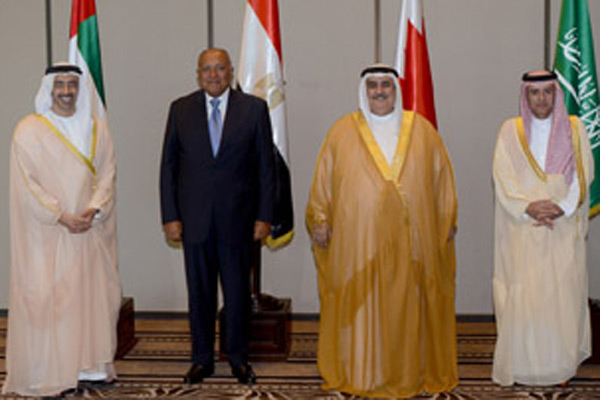
The foreign ministers following the talks. Image courtesy: BNA.
Commit to implement demands, Quartet tells Qatar
MANAMA, July 31, 2017
Qatar must commit to implement the 13 anti-terror demands made by the four Arab states that have imposed sanctions on the country before talks can begin, the quartet said yesterday.
Saudi Arabia, the UAE, Bahrain and Egypt expressed their willingness to engage in dialogue with Qatar, provided it declares its sincere and practical desire to stop its support and funding for terrorism and extremism and dissemination of hatred speech and incitement, to commit itself to non-interference in the affairs of other countries and to implement the 13 demands that guarantee peace and stability in the region and the world, a statement issued following a meeting of the foreign ministers of the countries in Bahrain said.
The four countries affirmed the six principles announced at the Cairo meeting, which represent the international consensus on the fight against terrorism, extremism and its funding, and rejection of interference in the affairs of other countries, which is contrary to international laws, said a Bahrain News Agency report.
Saudi Foreign Minister Adel Al Jubeir, Bahrain's Foreign Minister Shaikh Khalid bin Ahmed Al Khalifa, the UAE's Minister of Foreign Affairs and International Cooperation Sheikh Abdullah bin Zayed Al Nahyan, and Egyptian Foreign Minister Sameh Shoukry attended the meeting.
They also affirmed the importance of implementing the 2013 and 2014 Riyadh Agreements which have not been implemented by Qatar.
The four countries also stressed that all measures taken against Qatar are sovereign and in conformity with the international law.
The ministers also discussed the need for Qatar to stop disseminating hatred speech and incitement and interfering in the internal affairs of other countries.
The ministers expressed gratitude and appreciation to His Majesty King Hamad bin Isa Al Khalifa for receiving them and for sharing his insightful vision to achieve common Arab interests and the continued close solidarity among the four countries in dealing with all the challenges they are confronting.
The ministers reviewed the latest developments regarding the crisis in Qatar and the regional and international contacts they made, stressing the continued close coordination among them, in order to enhance solidarity among their countries, support Arab national security and root out terrorism to further preserve regional and international peace and security.
They expressed their appreciation for the role played by His Highness Shaikh Sabah Al Ahmed Al Sabah, the Emir of the State of Kuwait, to resolve the Qatar crisis within an Arab framework.
The four countries denounced the deliberate move by the Qatari authorities to obstruct the performance of Haj rituals for Qatari nationals. In this regard, they commended the facilities provided by the Saudi government to welcome all pilgrims.
The ministers agreed to continue their consultations and coordination regarding this issue in their forthcoming meetings.








